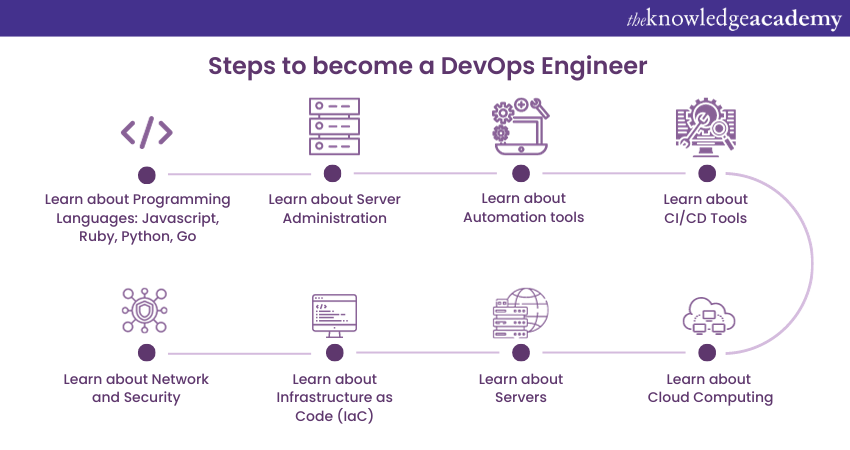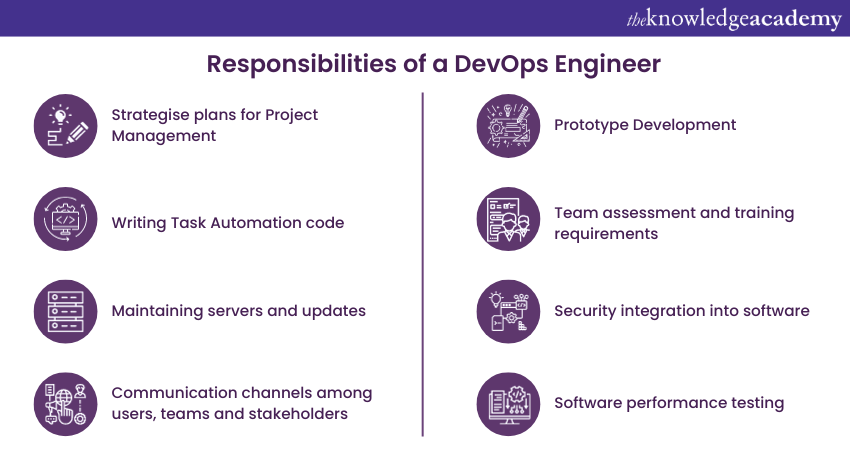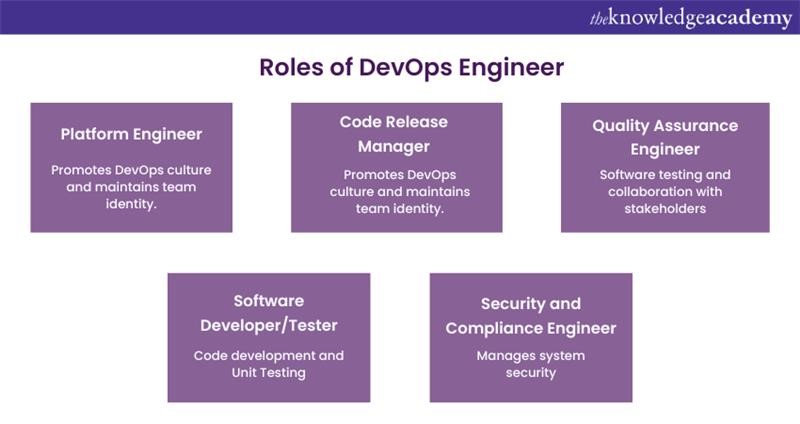We may not have the course you’re looking for. If you enquire or give us a call on 01344203999 and speak to our training experts, we may still be able to help with your training requirements.
Training Outcomes Within Your Budget!
We ensure quality, budget-alignment, and timely delivery by our expert instructors.

The DevOps Engineer title is used to describe an individual who understands the value of information exchange. The main responsibility of the professional is to shorten the software lifecycle to increase update release frequency.
According to research by Statista, about 60 percent of teams utilise DevOps models with Continuous Integration/Continuous Deployment (CI/CD) workflows to meet their project requirements. Another study by Gartner revealed that Agile Leaders made up 46 per cent of Chief Information Officers (CIOs) who apply DevOps techniques. Read this blog to learn more about DevOps Engineers, their duties, and the qualifications required to become one.
Table of Contents
1) Understanding who is a DevOps Engineer?
2) How to become a DevOps Engineer?
3) Responsibilities of DevOps Engineers
4) Roles of DevOps Engineers
5) Salary of DevOps Engineers
6) Conclusion
Understanding who is a DevOps Engineer?
A DevOps Engineer is an IT generalist with extensive experience in development and operations, with a focus on DevOps toolchains, system administration, infrastructure management, and coding. Since DevOps Engineers collaborate across the organisation to foster a more collaborative environment, they should also have strong interpersonal skills.
DevOps Engineers must be well-versed in standard system architecture, provisioning, and administration. They also need to be comfortable with source control, delivering and receiving code reviews, creating unit tests, and Agile principles.
How to become a DevOps Engineer?
DevOps Engineers need a bachelor's degree, some practical experience, and a love of writing code and troubleshooting development issues. Discussed below are step by step ways on How to Become a DevOps Engineer. Follow this DevOps roadmap to get a clearer picture:
Step 1: Learn coding
Coding expertise is a prerequisite for becoming a DevOps Engineer. You can learn the fundamentals of programming through online coding courses and bootcamps that are both free/paid and readily available. First, you should become familiar with common coding languages such as:
a) JavaScript
b) HTML
c) CSS
d) C++
e) Python
Data Analytics courses can help you learn and practice the more intricate concepts of data structures, which are frequently included in programming. Key topics to learn in programming are:
a) Data structures
b) Algorithms
c) Databases and SQL
d) Object-Oriented Programming Languages (OOP)
e) Integrated Development Environments (IDEs)
f) Web development
g) Cloud Computing
h) Containers
i) Text editors
Step 2: Understand Operating Systems
Additionally, you should familiarise yourself with the common Operating Systems (OS), such as Windows, Linux, macOS, Android, and iOS. Knowing OS involves both hardware and standard features like:
a) Main memory management
b) Secondary storage management
c) Security management
d) Processing management
e) File management
f) Network management
g) Command interpreter system
h) I/O device management
Step 3: Earn a bachelor's degree
Employers frequently consider a DevOps Engineer's abilities over their educational background. But most employers still respect a degree because it demonstrates that you have a well-rounded educational background. The following are beneficial bachelor's degrees for DevOps engineers:
a) Software design
b) Software engineering
c) Information technology
d) Computer programming

Step 4: Get certified
In order to showcase their abilities to prospective employers, DevOps Engineers should obtain one or more certifications. There's no single DevOps certification that applies to all. Popular certifications include:
a) Docker Certified Associate (DCA)
b) Certified Kubernetes Administrator (CKA)
c) Architecting with Google Cloud Platform
d) AWS Certified DevOps Engineer — Professional
Step 5: Get hands-on experience in DevOps Engineering
You will need some experience under your belt in order to become a DevOps Engineer. Working with developers to observe what they're doing is one way to achieve this. You can get ready for DevOps roles by being aware of current processes.
If you work as a techie, you can also begin writing code to automate current procedures. As an alternative, obtaining an internship in development, operations, or DevOps can assist you in gaining practical experience.
Additional tips for obtaining internships and other hands-on training includes the following:
a) Make a GitHub account so you can store all of your coding projects there and include a link to it on your resume.
b) Another way to obtain experience and discover DevOps opportunities is to make connections with other DevOps professionals.
Step 6: Start applying for DevOps Engineer jobs
For DevOps Engineer positions, most professionals are qualified after obtaining a degree, certifications, and experience. It's time to demonstrate your expertise to the real world. When applying for DevOps Engineering jobs, you'll need a strong portfolio that showcases your technical expertise, licenses, and degrees. Previous work experience and networking connections can help to find DevOps engineer jobs quickly.
Learn the key concepts of SQL servers and perform data modelling for vast volumes of data with our Introduction to SQL Databases Training 10985c now!
Responsibilities of DevOps Engineers

DevOps Engineers generally manage operations across various departments. Following are the key Responsibilities of a DevOps Engineer:
1) Project Management: DevOps Engineers create strategic plans utilised in implementing IT projects (Devops roadmap). The project risks, benefits, costs and operational expectations are all assessed before developing the project plans.
2) Writing and editing code: DevOps Engineers typically spend a portion of their time writing and improving code. They also find ways to improve task automation and resolve concerns with the application interface. A DevOps Engineer must be proficient with programming languages, although they may delegate coding tasks to other Software Developers.
3) System administration: DevOps Engineers maintain the smooth operation of computer servers, networks and clouds by performing system administration. They also perform other maintenance tasks such as software updates, system configurations, data backups, etc. Furthermore, DevOps also identify vulnerabilities and anomalies through system log reviews.
4) Promoting communication: DevOps Engineers help facilitate communication amongst business users, IT operations and software development teams. Their involvement as a liaison helps ensure high-velocity deliveries of applications. DevOps Engineers need to track the communication of their team members across various channels. This ensures a smooth project workflow.
5) Prototyping: DevOps Engineers develop prototypes of the various software tools, then present them to the developer team for implementation. The prototypes are developed to address specific problems and to define the relevant system interfaces.
6) Evaluating and coaching: DevOps Engineers on a senior level are required to assess their team’s performance. In addition to automating IT systems, they also identify the training requirements of their staff in programming and soft skills such as leadership and communication. The Engineers essentially help in filling the skill gaps for the team members.
7) Security: DevOps Engineers especially ensure the safety of the company’s data by integrating security measures into the software processes. They must also make sure the updates do not produce any vulnerabilities. The prompt identification and address of system breaches are two essential priorities of DevOps since they utilise significant amounts of automation in their regular work.
8) Testing system performances: The creation and running of software application tests are pivotal to the Quality Assurance (QA) process handled by DevOps Engineers. Their assessment of every programming method is necessary for context with the corresponding task. DevOps Engineers help identify infrastructure flaws and then write the necessary code to resolve the problem. Otherwise, they can delegate the work to Software Engineers for a solution.
Learn to automate deployment and manage cloud-native applications using Kubernetes. Dissect its intricacies with our Kubernetes Training!
Roles of DevOps Engineers
DevOps Engineers aim to change the traditional process of putting the burden of the code’s responsibility on the operations team. The handover from the development team to the operations team would leave room for minimal guidance from the development team. This typically resulted in a pile-up of backlogs and strained the process of building trust and collaboration between the development and operations teams.

The DevOps Engineers come into the picture to introduce a more streamlined workflow of DevOps Stages leading to higher quality products and marketing time. Improving productivity results in fewer problems that need to be solved over time, allowing the team to invest more time in innovating the current products.
Let’s discuss the five DevOps Engineer job roles:
Platform Engineer: The Platform Engineer is seen as a change agent who owns and delivers the change in the DevOps culture. They build and maintain the DevOps team identity.
The duties of the Platform Engineer are:
1) Explore the role of a DevOps Engineer, covering responsibilities, skills, and the Benefits of DevOps practices in streamlining development and operations for improved software delivery and efficiency. Read more to find out!
2) Scaling Cloud-based programs
3) Ensuring that the development and operations teams are on the same page
4) Determining the key roles in the team
5) Ensuring adequate training of all team members
Code Release Manager: The Code Release Manager role of the DevOps team holds the role of a Project Manager. The Release Manager needs proficiency in their technical knowledge and expertise to maintain the product’s development and quality delivery. More importantly, the Code Release Manager of the DevOps team needs to understand how to leverage the Agile methodologies implemented in the team’s software lifecycle.
The key duties of the Code Release Manager involve the following:
1) Managing products and applications from the stage of development to deployment
2) Tracking the DevOps progress using key metrics
Quality Assurance (QA) Engineer: The QA Engineer identifies problems in the software application by creating tests, usually before a project launch. The Engineer conducts tests involving other tasks like developing and running new tests. They then report the test results to the Project Stakeholders, who collaborate with the Engineer to tackle software bugs.
Software Developer/Tester: The role of the Software Developer or Tester is to develop the code and test it in a DevOps setting. The Developer does unit testing and deploys the code in the production environment. The deployment is followed by ongoing monitoring, an expanded role for Developers compared to a traditional Software Developer.
The key duties of the Software Developer/Tester are as follows:
1) Writing code for newly launched products, security patches and features
2) Checking that the code is on par with the business requirements
3) Unit Testing
4) Deploying the program
5) Monitoring the product performance
Security and Compliance Engineer: The role of the Security and Compliance Engineer is to oversee the system security. The Engineer works with the development team as part of the DevOps team. The Engineer handles the integration of the security recommendations during product development. Contrary to a traditional process, the security integration would be done during postproduction. The SCE Engineer especially works with all departments to fulfil the company’s criteria for data safety.
The key duties of the Security and Compliance Engineer are as follows:
1) Ensures the compliance of the product with established standards
2) Works with the development team to ensure product safety and security against external attacks.
Elevate your cloud computing expertise with our Advanced Architecting on AWS Professional Certification. Sign up today!
Salary of DevOps Engineers
|
Roles |
Experience (Years) |
Salary |
|
Platform Engineer |
Fresher |
GBP 49,955 |
|
Intermediate |
GBP 68,125 |
|
|
Experience |
GBP 99,000 |
|
|
Code Release Manager |
Fresher |
GBP 40,250 |
|
Intermediate |
GBP 42,500 |
|
|
Experience |
GBP 47,500 |
|
|
Quality Assurance Engineer |
Fresher |
GBP 32,835 |
|
Intermediate |
GBP 40,250 |
|
|
Experience |
GBP 55,808 |
|
|
Software Developer/Tester |
Fresher |
GBP 35,150 |
|
Intermediate |
GBP 45,250 |
|
|
Experience |
GBP 65,401 |
|
|
Security and Compliance Engineer |
Fresher |
GBP 31,105 |
|
Intermediate |
GBP 37,731 |
|
|
Experience |
GBP 65,201 |
Source – Glassdoor
Conclusion
To sum up, the six roles discussed above work together to form a collaborative workspace environment where the products share accountability. DevOps Engineers can help significantly improve product quality while simultaneously helping to market them faster. This results in an improved Software Development Life Cycle and quality delivery to happier customers. We hope you now have a clear picture of the prospects of becoming a DevOps Engineer.
Learn to implement different types of deployments for application features in AWS. Sign up for the AWS Professional DevOps Engineer Training course now!
Frequently Asked Questions

Yes, DevOps Engineers are often highly paid. The demand for DevOps professionals has increased significantly in recent years as more organisations recognise the importance of efficient collaboration between development and operations teams. DevOps Engineers play a crucial role in streamlining the software development lifecycle, improving deployment processes, and enhancing overall system reliability.

Yes, DevOps involves a certain amount of coding, but it's not solely about programming. DevOps, short for Development and Operations, is a collaborative approach that aims to streamline the processes between software development and IT operations. While coding is a component of DevOps, it also encompasses other critical aspects such as automation, collaboration, communication, and cultural practices.

DevOps and programming are distinct but interconnected fields. While programming involves writing code, DevOps focuses on collaboration and automation to streamline software development and deployment. Comparing difficulty is subjective; some find programming challenging due to coding intricacies, while others may struggle with DevOps' coordination demands.

The Knowledge Academy takes global learning to new heights, offering over 30,000 online courses across 490+ locations in 220 countries. This expansive reach ensures accessibility and convenience for learners worldwide.
Alongside our diverse Online Course Catalogue, encompassing 17 major categories, we go the extra mile by providing a plethora of free educational Online Resources like News updates, blogs, videos, webinars, and interview questions. Tailoring learning experiences further, professionals can maximise value with customisable Course Bundles of TKA.
The Knowledge Academy’s Knowledge Pass, a prepaid voucher, adds another layer of flexibility, allowing course bookings over a 12-month period. Join us on a journey where education knows no bounds.

The Knowledge Academy offers various DevOps Courses, including Certified DevOps Security Professional (CDSOP), Certified SecOps Professional etc . These courses cater to different skill levels, providing comprehensive insights into Certified DevOps Professional methodologies.
Our DevOps Engineer blog covers a range of topics related to DevOps professional, offering valuable resources, best practices, and industry insights. Whether you are a beginner or looking to advance your DevOps skills, The Knowledge Academy's diverse courses and informative blogs have you covered.
Upcoming Programming & DevOps Resources Batches & Dates
Date
 Certified DevOps Professional (CDOP)
Certified DevOps Professional (CDOP)
Thu 13th Jun 2024
Thu 3rd Oct 2024
Thu 19th Dec 2024







 Top Rated Course
Top Rated Course



 If you wish to make any changes to your course, please
If you wish to make any changes to your course, please


